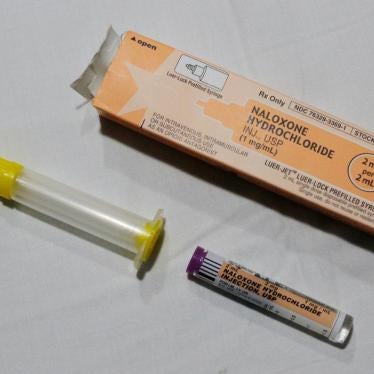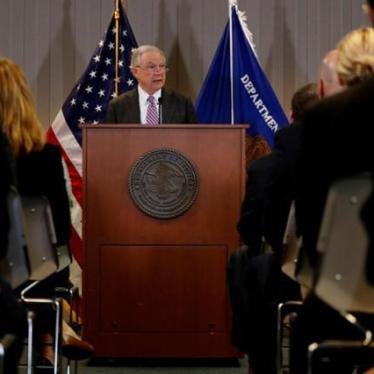The Honorable Chuck Grassley
135 Hart Senate Office Building
Washington, D.C. 20510
The Honorable Dianne Feinstein
331 Hart Senate Office Building
Washington, D.C. 20510
Dear Chair Grassley and Ranking Member Feinstein:
We, the undersigned, write to you today to urge you to reject any efforts to reduce the fentanyl and analogue quantities in 21 U.S.C. §§ 841 and 960, or to increase the lengths of these mandatory minimum sentences, as you consider opioid legislation in the committee. We oppose any effort to amend S. 2645, S. 2535, S. 2789, S. 207, S. 2838, or S. 2837 by adding S. 2635, the Ending the Fentanyl Crisis Act of 2018, or any other legislation similar to S. 2635.
We understand and share the deep concern about the opioid overdose crisis and fentanyl in particular. Over 63,000 people died from opioid overdoses in 2016. State opioid overdose death rates range from 6.4 per 100,000 people in Nebraska to 52 per 100,000 in West Virginia.[1] With such startling statistics, it is crucial that Congress pass evidence-based policies that work – and mandatory minimums do not. Lowering the statutory weight thresholds for fentanyl and its analogues, or increasing current penalties, will fail to curb fentanyl supply or demand and will give lengthy, expensive prison sentences to more low-level sellers and individuals who struggle with addiction.
If anything demonstrates the failure of mandatory minimums, it is the opioid overdose crisis. We have had harsh five-, 10-, 20-year, and life without parole mandatory minimum sentences for fentanyl and fentanyl analogues for 30 years, and they did not prevent and have not stopped the manufacture, traffic, or use of these drugs. Reducing fentanyl quantities and applying their lengthy penalties to more people with less drugs will not reverse this. Instead, Congress should invest more resources into alternatives that are proven to reduce drug use, addiction, and overdoses, like effective treatment and overdose prevention programs in our communities.
Making current mandatory penalties harsher will not deter drug trafficking or use or reduce drug supply, either. The Department of Justice’s National Institute of Justice has found that the length and severity of a punishment does not deter crime. Rather, it is the certainty of being caught and swiftly punished that deters criminal behavior.[2] The Pew Charitable Trust released a 50-state report that found no statistically significant relationship between drug sentencing and three key indicators of drug problems: drug use, drug overdoses, and drug arrests.[3] These findings reinforce what we already know: study after study shows that incapacitation does little to slow the drug trade because low-level dealers (the ones who would certainly be impacted if drug thresholds are reduced) are easily replaced. Furthermore, incapacitating suppliers does nothing to curb demand; effective treatment does.
Lowering fentanyl quantities will also produce counterproductive and unintended consequences. First, it may cause some illicit manufacturers to make this drug even more potent and fatal in even smaller quantities – a product no one wants on the streets. Second, it will apply mandatory minimum penalties that Congress intended for major traffickers to low-level drug offenders, people who use drugs, and individuals who struggle with addiction.
The U.S. Sentencing Commission has repeatedly found that current mandatory minimum sentences apply mostly to those who play low-level roles in drug conspiracies, such as mules, couriers, or street-level sellers – and this holds true in fentanyl cases.[4] It is true that a very small amount of fentanyl may prove fatal if misused. Nonetheless, the current fentanyl quantities do seem reasonably targeted at mid-level or major dealers or importers. Reducing fentanyl quantities will misapply mandatory minimums to more low-level sellers and people who use drugs, wasting prison cells and taxpayer resources on people who pose less threat to public safety, are easily replaced in the drug trafficking chain, or need treatment.
Third, smaller fentanyl quantities will punish many people who use drugs and people who struggle with addiction for drugs they may not even be aware they have in their possession. Because fentanyl is usually added to drugs before they get to the streets for sale, street-level sellers or people who use drugs often do not even know that their drugs contain fentanyl. People who use heroin or cocaine and share drugs with friends or sell to support their own addictions may not know that they are sharing drugs laced with fentanyl, but under S. 2635, they would face a five-year mandatory minimum for having a mere two grams of a mixture of a substance containing a detectable amount of fentanyl. A person who unknowingly possesses 1.999 grams of baking soda with 0.001 grams of fentanyl mixed in would face this mandatory minimum sentence. The same five-year mandatory minimum sentence would apply to someone with five grams of 100-percent pure fentanyl. Additionally, fentanyl can be trafficked in many forms, including pills. For example, a 10 milligram dose of hydrocodone weighs approximately 0.65 grams.[5] Using a reduced threshold of two grams, it would take only four hydrocodone pills laced with fentanyl to trigger the five-year mandatory minimum. These results would not be just, cost-effective, or make the public safer.
Congress was wise to pass the Comprehensive Addiction and Recovery Act (CARA) and the Fair Sentencing Act (FSA), a bill that increased drug quantities to more appropriately target the mid- and high-level sellers for whom Congress intended mandatory minimum sentences. Proposals to reduce fentanyl and fentanyl analogue thresholds are antithetical to CARA and the FSA and waste money with no corresponding public safety increase. We understand fully the crisis that our country is currently facing. The rise in drug overdose deaths is not a problem we take lightly. However, we cannot afford to fall back on failed policies of the past as lives continue to be lost to these powerful drugs.
Thank you for your time and consideration. We are happy to provide more assistance to your offices as you consider this important issue.
Sincerely,
AIDS Alabama (AL)
Aleph Institute
American Civil Liberties Union
Blacks in Law Enforcement of America
BOOM!Health (NY)
Broken No More
The Brotherhood/Sister Sol (NY)
Charles Hamilton Houston Institute for Race & Justice, Harvard Law School
Church of Scientology National Affairs Office
Clergy for a New Drug Policy
The Community Health Outreach Work (CHOW) Project (HI)
The Connecticut Bail Fund (CT)
Criminal Justice Policy Foundation
#cut50
The Daniel Initiative
Due Process Institute
Drug Policy Alliance
Drug Policy Forum of Hawai’i (HI)
Drug Policy Forum of Texas (TX)
Empire State NORML (NY)
Families Against Mandatory Minimums
FedCURE
FreedomWorks
Friends Committee on National Legislation
GRASP (Grief Recovery After a Substance Passing)
Harm Reduction Coalition
Harm Reduction Michigan (MI)
HIPS (DC)
Health Equity Alliance
Hep Free Hawaii (HI)
Human Rights Watch
Justice Strategies
Karen Garrison, President of Mommieactivist and Sons
Law Enforcement Action Partnership
The Leadership Conference on Civil and Human Rights
Legal Action Center
Life for Pot
Life Foundation (HI)
MomsRising
NAACP
National African American Drug Policy Coalition, Inc.
National Alliance for Medication Assisted Recovery
National Association of Criminal Defense Lawyers
National Council of Churches
National Immigration Project of the National Lawyers Guild
National Urban League
November Coalition
One Million Americans (CT)
Peer Network of New York (NY)
Project Inform
Protect Families First
Public Justice Center
QC Harm Reduction (IA)
Reentry Central (CT)
Safe Streets Arts Foundation
San Francisco Drug Users Union (CA)
San Francisco Safety and Wellness Coalition (CA)
Sex Workers and Allies Network (CT)
Sonoran Prevention Works (AZ)
St. Ann’s Corner of Harm Reduction (NY)
StoptheDrugWar.org
Students for Sensible Drug Policy
Supernova Women
The Prison Consultants
The Sentencing Project
Tray Johns, Executive Director of Fedfam4life
Treatment Communities of America
Unitarian Universalist Association
Van Jones, President of The Dream Corps
VOCAL-NY (NY)
WOLA - Washington Office on Latin America
Witness to Mass Incarceration
Women’s Alliance for Theology, Ethics and Ritual (WATER)
Women Who Never Give Up
cc: Members of the Senate Judiciary Committee
[1] “Drug Overdose Death Data” Center for Disease Control and Prevention. https://www.cdc.gov/drugoverdose/data/statedeaths.html
[2] “Five Things about Deterrence” National Institute of Justice, May 2016. https://www.ncjrs.gov/pdffiles1/nij/247350.pdf
[3] “More Imprisonment Does Not Reduce State Drug Problems,” The Pew Charitable Trust, March 2018. http://www.pewtrusts.org/~/media/assets/2018/03/pspp_more_imprisonment_does_not_reduce_state_drug_problems.pdf
[4] U.S. Sentencing Comm’n, Public Data Presentation for Synthetic Cathinones, Synthetic Cannabinoids, and Fentanyl and Fentanyl Analogues Amendments (Jan. 2018) (showing that a majority of defendants sentenced for fentanyl offenses are low-level dealers; of the 51 persons convicted of a fentanyl-related offense in FY 2016, 29 served “street-level dealer,” “courier/mule,” and “employee/worker” functions).
[5] “Opinions Are Mixed About Sentencing Laws for Painkiller Trafficking” The Florida Legislature Office of Program Policy Analysis and Government Accountability, January 2012. http://www.oppaga.state.fl.us/MonitorDocs/Reports/pdf/1202rpt.pdf







